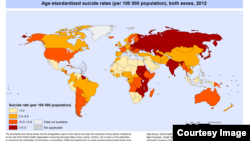The World Health Organization reports more than 800,000 people die by suicide every year. WHO, which is launching its first global report on suicide prevention, said more people die from suicide than from conflicts, wars and natural disasters combined.
The World Health Organization reported every 40 seconds a person somewhere in the world commits suicide. Despite this shockingly high statistic, WHO said only a handful of countries have policies aimed at suicide prevention.
WHO Director of Mental Health and Substance Abuse Shekhar Saxena said there also is much more that communities can do to provide support for vulnerable people. He said suicide is the final outcome for people who are feeling isolated, depressed and hopeless. He said society can do more to provide support to them at a moment of great distress.
“People who eventually commit suicide have, almost in all cases, sought help from someone. It can be a friend, it can be a family member, it can be a health care system, it can be a social care system. It could be a religious organization and very often this request or plea for help was not responded to positively. So communities, families have a responsibility to be available and to provide the kind of support which people need,” explained Saxena.
The World Health Organization calls suicide a major global health problem. It said a common misconception is that suicides are a Western and developed country phenomena. In reality, it said some 75 percent of suicides occur in low-and-middle-income-countries.
It cites the most common methods of suicide globally as pesticide poisoning, hanging, and firearms. Data from a number of European countries, the United States and other developed nations shows limiting access to these means can help prevent people dying by suicide.
The U.N. health agency finds suicide rates globally are highest in people aged 70 years and over. However, Dr. Saxena said young people are greatly at risk. He noted suicide is the second leading cause of death among those between 15 and 29.
“Overall in the world, more men commit suicide than women. Although in richer countries, in the more developed countries, the proportion is many more men compared to women. In developing countries, the proportion is less skewed," Saxena noted. "That means …of course, there is still more men, but definitely not as much as in developed countries.”
WHO said the highest rates of suicide are found in Central and Eastern Europe and in some Asian countries. It said suicide rates in Africa appear to be on the low side. But, it cautions data from that region is scant and not very reliable.
Health officials agree that celebrity suicides can provoke copycat behavior. Scientist in the WHO’s Department of Mental Health and Substance Abuse, Alexandra Fleischmann, told VOA there is a link between the way in which suicides are reported in the media and acts that are committed thereafter.
“So, this underlines and emphasizes the role the media play in reporting suicide cases. Suicide should not be glamorized or sensationalized in the media because of the imitation that can follow,” stated Fleischmann.
Among its recommendations, the World Health Organization is calling for an end to the criminalization of attempted suicide. It says there currently are 25 countries in the world -- in Africa, South America, and Asia -- where both suicide and attempted suicide are considered criminal acts. It says even people who unintentionally overdose on a substance may end up in prison instead of in a health facility that could help them heal.




